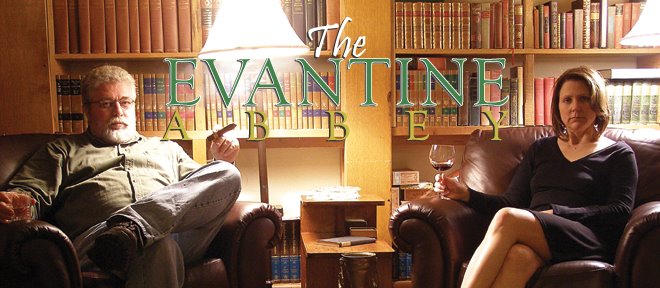Over the last 15 years, I have not been fond of the thought of stumbling upon an old high school buddy at the airport who knows just enough about my Pioneering days – now, thankfully, finally placing me in San Diego, California – to say, “So why did you move from Orlando, Florida to north Idaho?” My answer would likely vary according to the fanaticism of my mood.
I can thankfully now just say, ‘glad you asked, Christopher Hitchens just wrote an article about just this point in Slate, titled Faith No More . I’ll email you a link.’ Now Hitchens has to explain himself – and so I find my answer vicariously. Miller’s recent silliness in Newsweek is perhaps in part due to her puzzlement of Hitchens’ new attraction to yokels and one of their old Prophets in hills of north Idaho. In reply to Miller, Hitchens writes:
Wilson isn’t one of those evasive Christians who mumble apologetically about how some of the Bible stories are really just “metaphors.” He is willing to maintain very staunchly that Jesus of Nazareth was the Christ and that his sacrifice redeems our state of sin, which in turn is the outcome of our rebellion against God. He doesn’t waffle when asked why God allows so much evil and suffering—of course he “allows” it since it is the inescapable state of rebellious sinners. I much prefer this sincerity to the vague and Python-esque witterings of the interfaith and ecumenical groups who barely respect their own traditions and who look upon faith as just another word for community organizing. (Incidentally, just when is President Barack Obama going to decide which church he attends?)
This approach to religion in America, I think, will be an important part of the advance of the New Enlightenment. We need to look genuine religion – the real thing – directly in the eye and distinguish it from all the other superficial spin offs, whether it be the mush, the kitsch, the hand-waiving, the arid modernism, the irrational Bacchanalian rites of the holy rollers. It is all these past times of Americans that protect the real thing. Consequently, the real thing remains just enough alive to keep generating the spin offs. To stop the cycle, a disciplined focus on right up the [fill-in-the-blank] real Christian religion in America is in order.
Wilson enjoyed the writings of H.L. Mencken before concocting his social engineering project, which he later coined ‘The Kirk’. In fact, Menken provided what was one of the first lessons at New Saint Andrews – at least when I was a student there. Wilson lectured on Menken’s appreciation for Dr. Machen and thought such appreciation was a mark of real success. Machen was a zealous opponent of all the sloppy mind-muck that allowed ‘Christianity’ to flourish as it did in the 20th century, and consequently, the founding father of the new conservative Calvinism in America – from Princeton to the fundamentalist Westminster Theological Seminary, where Hitchens and Wilson debated. In 1931, H.L. Menken wrote the following about Dr. Machen for American Mercury:
. . . this Dr. Machen believes completely in the inspired integrity of Holy Writ, and when it was questioned at Princeton he withdrew indignantly from those hallowed shades . . . I confess frankly, as a life-long fan of theology, that I can find no defect in his defense of his position. Is Christianity actually a revealed religion? If not, then it is nothing; if so, then we must accept the Bible as an inspired statement of its principles. But how can we think of the Bible as inspired and at the same time as fallible? How can we imagine it as part divine and awful truth and part mere literary confectionery? And how, if we manage so to imagine it, are we to distinguish between the truth and the confectionery? Dr. Machen answers these questions very simply and very convincingly. If Christianity is really true, as he believes, then the Bible is true, and if the Bible is true, then it is true from cover to cover. So answering, he takes his stand upon it, and defies the hosts of Beelzebub to shake him. . . . Does he encounter witches in Exodus, and more of them in Deuteronomy, and yet more in Chronicles, then he is unperturbed. Is he confronted, in Revelation, with angels, dragons, serpents and beasts with seven heads and ten horns, then he contemplates them as calmly as an atheist looks at a chimpanzee in a zoo. . . His moral advantage over his Modernist adversaries, like his logical advantage, is immense and obvious.
At some point, however, now that Hitchens has helped redeem Wilson, he will need to go on and face some additional facts about the “sincerity” of this particular Dear Leader. Unlike Machen, a celibate professor of koine greek and “member of both Phi Beta Kappa and the American Philological Association”, Wilson built his career in the ways of a slightly evolved, plotting Orangutan. Living sparingly on honey and locust heads, Wilson generated tithes and offerings for himself and progeny through imprecatory chants against local professors, ravings against science, the censoring of the media, the lying to his lambs, and the spawning of many Roman-like ‘persecutions’ against himself by any stick big enough for the job, which included a plagiarized booklet on the wonderful harmony between slave and free in the old South. Many enemies were generated from within the tribe as well, making the imprecations of David all the more apropos.
Wilson isn’t laboring for an academic tradition, or the glory of God, or love, or out of empathy for his fellow man. Wilson, rather, studied H.L. Menken early in life so that he could get this write-up published in Slate magazine much later. Wilson has a plan, he lusts incessantly for attention and control, and, I have come to fully believe after years of painful experiment and research, he has the full capacity to rape and maim any sentient organism that might get in his way. This is true, at least, so long as the world would allow him keep his pulpit and halo. In other words, he plans to do nothing he cannot get away with. And, thankfully, the backlash to Wilson has been vehement and loud and sustained enough, particularly from his close neighbors in his small town who actually know enough about him, to all but neuter this old bull.
But becoming evangelicalism’s new apologist does not change the kinds of biological vestiges our priestly and bloody ancestors have bequeathed to this valiant defender of God’s rule and crown. Wilson could care less whether or not he added anything to the apologetic arsenal for Christians that out live him; he – or at least an important part of his unconscious mind – would burn the entire thing to the ground for some more camera clicks, some more glory, and some higher seats for the males that have sprung from his loins or married within the clan. Wilson is some form of sociopath, for sure, but he does at least feel strongly and intensely over the moral virtues of loyalty (to him) and the power and wealth he is able to hand to his covenantal, biological, direct decedents.
The psychological complexities and the unusual brilliance of the unconscious mind the Lord has bestowed upon pastor Wilson is certainly a confounding factor in building the proper theory of this particular portal to heaven, but this just makes it all the more rewarding. And so my thanks to Hitchens for presenting him to the world, not bound and lashed, but just as he is.






 . . . Henry Kissinger, challenged on television to meet my accusation that he was responsible for war crimes and crimes against humanity, responded with a maniacal and desperate attempt to change the subject, and denounced me as a denier of the Nazi Holocaust. . . . I tell you about it not just in order to boast, though there is that. It went to make up for many, many other months, when the celebrity culture and the spin-scum and the crooked lawyers and pseudo-statesmen and clerics seemed to have everything their own way. They will be back, of course. They are always “back.” They never leave. But the victory is not pre-determined. And there are vindications to be had as well, far sweeter than anything contained in the meretricious illusion of good notices or “a good press.”
. . . Henry Kissinger, challenged on television to meet my accusation that he was responsible for war crimes and crimes against humanity, responded with a maniacal and desperate attempt to change the subject, and denounced me as a denier of the Nazi Holocaust. . . . I tell you about it not just in order to boast, though there is that. It went to make up for many, many other months, when the celebrity culture and the spin-scum and the crooked lawyers and pseudo-statesmen and clerics seemed to have everything their own way. They will be back, of course. They are always “back.” They never leave. But the victory is not pre-determined. And there are vindications to be had as well, far sweeter than anything contained in the meretricious illusion of good notices or “a good press.” The kind lady at the local Christian bookstore has been poised with my cell phone number in hand for a few days now, knowing my determination to somehow find an April issue of Christianity Today somewhere in San Diego. “Is there someone you know in this issue?” she asked. “Yes, there is.” Molly Worthen now has a seven page article on my old teacher, titled “The Controversialist.”
The kind lady at the local Christian bookstore has been poised with my cell phone number in hand for a few days now, knowing my determination to somehow find an April issue of Christianity Today somewhere in San Diego. “Is there someone you know in this issue?” she asked. “Yes, there is.” Molly Worthen now has a seven page article on my old teacher, titled “The Controversialist.”